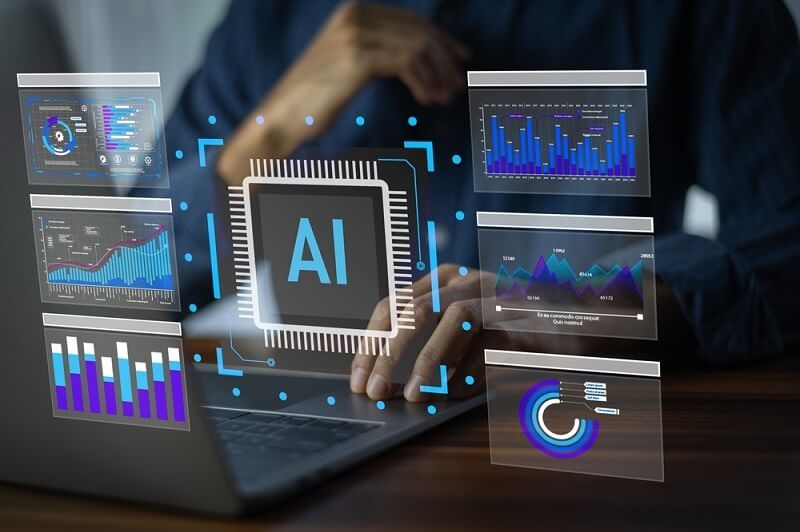
AI-driven learning is at the center of a change that is happening faster than ever before in the world of education. Artificial intelligence is not only assisting in education in 2025, but it is also making education a different process, and it is turning the way we acquire knowledge, teach it, and engage with it fundamentally different. Just imagine the classrooms without frontiers, educators assisted with intelligent systems aware of each student's advantages, and internet-based platforms that modify classes in real-time. This is not a future fantasy, but it is already taking place.
AI is taking the form of personalized tutoring and virtual reality classrooms, and it is defining the new age of education technology. This blog discusses how AI-based education technology is ensuring access to and efficiency and engagement of learning. Now, we can look into the future of learning: the future where technology and human ingenuity come together to realize the potential of every student.
AI has been an effective instrument in the current education system. However, by 2025, AI will no longer be a buzzword, but a foundation of student learning and teacher teaching. AI-driven learning refers to the use of sophisticated systems that can process data to forecast any learning requirements and tailor learning experiences to individual learners.
It is about making technology learn from students, like students learn from technology. This man-technology collaboration is transforming the process of learning to be quicker, one-on-one, and much more interactive compared to the conventional method.
In essence, AI-driven learning involves algorithms that monitor the responses of the students to lessons, quizzes, and materials. Such systems subsequently modify the difficulty level, propose resources, or even alter the teaching approach. As an example, when a student is not that good at solving math problems, the AI can show him simpler ones before proceeding to deeper ones.
Such clever flexibility enables the learners to work at their own speed, which lowers frustration and increases confidence. The educators will also have access to more information on the progress made by each specific student and thus be in a better position to support him or her.
Interestingly, modern AI systems are not just about logic and data—they’re also becoming emotionally intelligent. AI-driven tutoring programs can detect when a learner feels bored, frustrated, or excited, responding with encouragement or changing the activity.
This emotional intelligence would allow the establishment of a supportive and human-like, as opposed to robotic, learning experience. It makes sure that, despite a virtual learning environment where students are expected to feel disoriented, they feel empathetic with and connected to.
With the changes in the classroom setting, AI in the field of education technology is turning into the defining force of change. It offers a solution that achieves the balance between technology and human beings, making sure that students receive all the benefits of both the human and the intelligent spheres.

AI has made it possible to implement the idea of smart classrooms. Daily lessons now have interactive boards, real-time quizzes, and virtual assistants. Learners have an opportunity to pose voice questions to AI bots and get instant answers. Students can study anywhere around the globe on virtual learning platforms that are AI-driven, and this makes education borderless.
As the example of a student in California being able to attend a science lesson by a teacher in New York or even another country shows, AI-powered video learning platforms allow students to attend a lesson no matter the location. Such systems automatically regulate the quality of video, subtitles, and even summarize the session in the end.
Others are afraid that AI will depose teachers, and so it is not the idea. As a matter of fact, teachers are turning out to be AI partners. Routine tasks that can be addressed with artificial intelligence include grading or attendance monitoring, and it gives free time to teachers to address creative and emotional assistance to students.
AI is also in a position to determine when a student is falling behind, and thus, the teacher can intervene before it is too late. This produces an ideal combination of information-driven instruction and humanity.
The learning systems based on artificial intelligence are redefining the essence of lesson development and teaching. These systems interpret massive quantities of educational information to discover the most useful techniques of teaching that apply to various learning styles.
Every student learns differently. Some prefer visuals, others like hands-on practice, and some learn best through discussion. AI systems adapt lessons to suit each individual. This personalization ensures that no student is left behind.
Gone are the days when students waited days or weeks to get feedback on their performance. AI tools now provide real-time assessments, giving instant insights into what’s right and what needs improvement.
Online education has exploded in popularity, and AI-powered online courses are leading this movement. They are more interactive, personalized, and intelligent than traditional e-learning platforms.
Contrary to stagnant online courses, systems that are AI-driven engage in constant learning based on the performance of individual users. In case a learner does not understand a concept, the platform automatically gives a less complex explanation, additional videos, or real-life exercises.
Online courses are delivered with the help of AI, and it means that online tutors are virtual bots that respond to learners, clarify problematic issues, and even encourage them to keep up with the challenging classes.
Things have never been as bright in the future of AI in learning. An AI will inspire as it will teach as it grows more sophisticated. Schooling will be more imaginative, open, and emotionally sensitive in the coming years.
AI education platforms are already contributing to bridging the gaps in education in the world. Rural or underdeveloped students are now able to receive the same level of education as students in big cities. AI makes learning available to all, no matter what the language or whereabouts one is, or their finances, by translating in real-time and accommodating local demands.
AI education platforms are already contributing to bridging the gaps in education in the world. Rural or underdeveloped students are now able to receive the same level of education as students in big cities. AI makes learning available to all, no matter what the language or whereabouts one is, or their finances, by translating in real-time and accommodating local demands.
In the course of 2025, human intelligence and artificial intelligence are transforming the meaning of education. AI learning is not a technological advancement per se; it is also a cultural change. It is about making each student feel noticed, encouraged, and able to do more than they have ever done. The AI introduces individualization, sensibility, and universal learning. It makes teachers stronger, encourages children to learn, and makes education more inclusive.
This content was created by AI